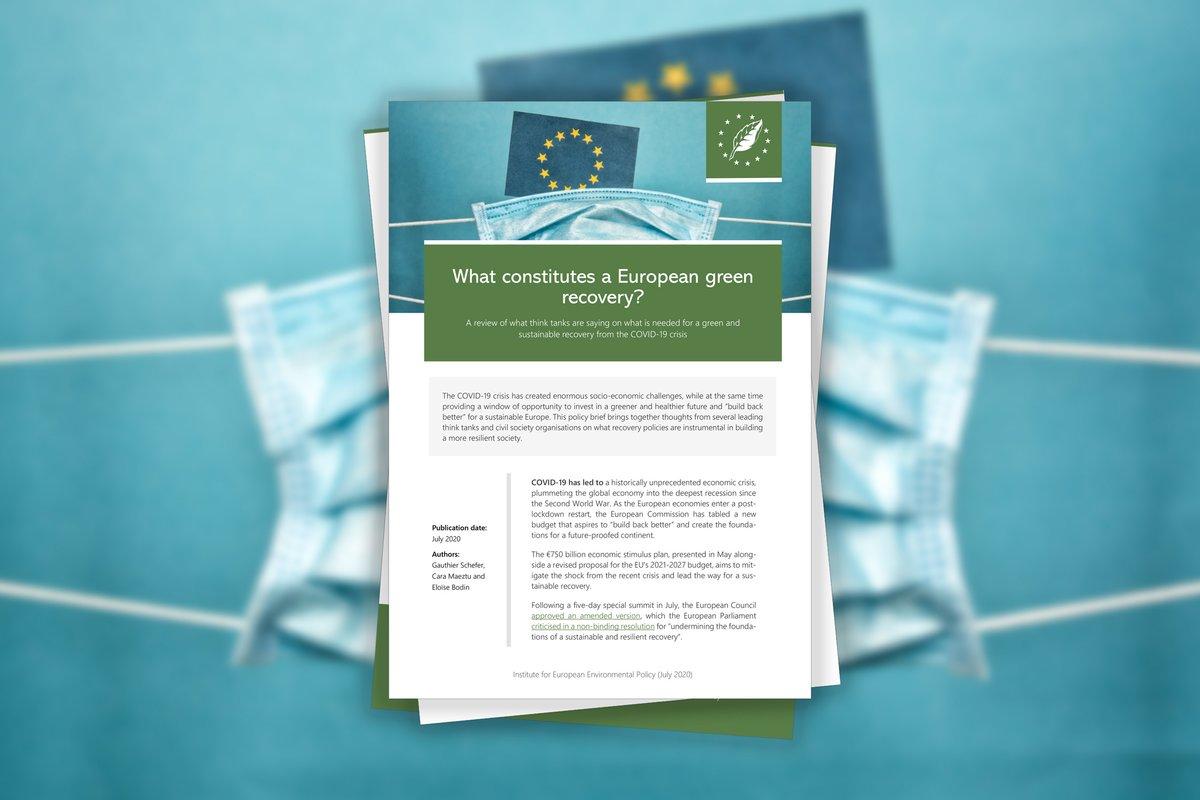AUTHORS: Gauthier Schefer – Cara Maeztu – Eloïse Bodin
A review of what think tanks and civil society are saying on the conditions for a green and sustainable recovery from the COVID-19 crisis
COVID-19 has led to a historically unprecedented economic crisis, plummeting the global economy into the deepest recession since the Second World War. As the European economies enter a post-lockdown restart, the European Commission has tabled a new budget that aspires to “build back better” and create the foundations for a future-proofed continent.
The €750 billion economic stimulus plan, presented in May alongside a revised proposal for the EU’s 2021-2027 budget, aims to mitigate the shock from the recent crisis and lead the way for a sustainable recovery.
| Given the acute climate and biodiversity crises, the difficult negotiations on the EU’s financial package must not bring down its environmental ambitions |
Following a five-day special summit in July, the European Council approved an amended version, which the European Parliament criticised in a non-binding resolution for “undermining the foundations of a sustainable and resilient recovery”.
Given the acute climate and biodiversity crises, the difficult negotiations on the EU’s financial package must not bring down its environmental ambitions. The momentum is greater than ever for the EU to set an example and bring together the 27 economies towards a carbon-neutral future and a sustainable economy.
This briefing outlines the elements that are of key importance for a truly green recovery in Europe. The elements are based on the sustainability test introduced by IEEP and its Think Sustainable Europe partners in April and draw on recent studies and publications by several European think tanks and other organisations.
| Note: While this briefing highlights specific points of interest put forward by the different organisations, it does not constitute an endorsement from IEEP of the positions expressed in those publications in their entirety. |
 |
Fiscal measures with a long-term vision
Financial aid sustainability conditions (Transparency International and Vivid Economics)
| Gaita, E. (2020). Why business bailouts must be conditional on responsible tax commitments. Press release issued on 12.5.2020, Transparency International EU.Vivid Economics & Finance for Biodiversity Initiative (2020). Integrating climate change and biodiversity into the response to COVID-19: Bailout measures. Vivid Economics. |
Fiscal support measures taken today will have long-term environmental, social, and economic implications. A fast recovery without a long-term vision can trap European economies in unsustainable lock-ins.
Despite the calls from civil society against unrestricted government bailouts, a tracker created by Transport & Environment shows that many EU airlines have received financial support without any binding climate conditions, when the main focus of public spending should be on business models that are expected to be viable in the post-crisis economy, with high potential of job creation and ecological transformation.
| Transparency International argues that support given to firms should be conditional on making the changes required to achieve the EU’s societal objectives |
In a recent policy position, the anti-corruption network Transparency International (TI) argues that support given to firms should be conditional on making the changes required to achieve the EU’s societal objectives and ensure fairness for all companies and businesses sectors during the recovery.
According to TI, bailouts must incentivise responsible tax conduct commitments. Annually, over $500 billion is lost in tax revenue due to tax avoidance by large multinational companies.1
To achieve more responsible tax conduct among industries and businesses, TI proposes several measures, including ensuring that companies that receive national or EU-level bailouts explicitly commit to “not making artificial use of tax havens”. To assure accountability, businesses should declare their profits in countries where they are generated and demonstrate full tax transparency.
Another recommendation comes from a recent paper by Vivid Economics, in which the authors argue that any government bailout must bring out sustainability-oriented reforms in companies’ business models. Companies would have to commit to transparently set and report on indicators and targets that reflect the sustainability of their businesses. To achieve this, the authors recommend building on the emerging sustainability standards, including the EU Taxonomy, Climate Bonds Taxonomy and the UN SDG ABC impact classification.
Fossil fuel subsidy reform (SEI and IISD)
| Johnson, O., Shawoo, Z., Talebian, S., Kemp-Benedict, E. and Lindblom, A. (2020). Shaping a sustainable and low-carbon recovery that spurs industry transition. Stockholm Environment Institute.Bridle, R., Sharma, S., Mostafa, M., and Geddes, A. (2019). Fossil Fuel to Clean Energy Subsidy Swaps: How to pay for an energy revolution. Global Subsidies Initiative Report, International Institute for Sustainable Development. |
The Stockholm Environment Institute, on the basis of a report by IISD, has shown that eliminating – or at least reforming – EU fossil fuel subsidies, valued at around €39 billion2, could help cover the costs of the transition to clean energy while saving taxpayers’ money.
| More than $151 billion have so far been committed to fossil fuel funding in G20 countries’ recovery packages |
An energy funding tracker created by several research organisations, including SEI and IISD, shows than more than $151 billion have so far been committed to fossil fuel funding in G20 countries’ recovery packages, including in three EU Member States: France, Italy, Germany.
With every euro spent, carbon lock-ins intensify. According to SEI, various government measures could help reform such subsidies. This includes eliminating subsidies for air travel like the free EU emission trading system (ETS) allowances.
According to IISD, meanwhile, financial flows previously channelled to the fossil fuel industry will need to be redirected – or swapped – towards investments in clean energy systems.3 Alternatively, savings from the end of fossil fuel subsidies could be redistributed equally amongst the citizens to offset the costs of the transition.
Increase in environmental taxation (Bruegel)
| McWilliams, B., Tagliapietra, S. and Zachmann, G. (2020). Greening the recovery by greening the fiscal consolidation. Bruegel. |
Carbon prices can play a meaningful function in shaping future economic systems. The aftermath of the 2008-2009 crisis has shown that stimulus funding is the most effective when aligned with long-term price signals.4
| Bruegel shows that increasing the price of future carbon emissions is necessary for encouraging broad cooperation in a green recovery. |
In a recent policy brief, Bruegel shows that increasing the price of future carbon emissions is necessary for encouraging broad cooperation in a green recovery. The authors put forward the idea of a ‘green consolidation’, meaning that when explicitly green stimulus measures are difficult to implement, implicit greening can be achieved by adjusting market expectations to a future context of higher carbon prices.
For that reason, the EU needs to significantly increase carbon prices after 2021 to trigger market adaptation to an anticipated price rise, the authors argue and point to two major EU legislations in need of revising: the ETS and the energy taxation directive (ETD, 2003/96/EC).
 |
Recognition of the value of ecosystem services
Natural capital investment (Smith School of Enterprise and Environment)
| Hepburn, C., O’Callaghan, B., Stern, N., Stiglitz, J., and Zenghelis, D. (2020). Will COVID-19 fiscal recovery packages accelerate or retard progress on climate change?, Oxford Smith School of Enterprise and the Environment, Working Paper 20-02. |
The COVID-19 pandemic has reignited the discussion around the risks related to the emergence (and re-emergence) of infectious diseases caused by animal-to-human transmission and linked to climate change and biodiversity loss.5
| Nature protection is not identified as an area for investment in the EU recovery package |
A working paper by the Smith School of Enterprise and the Environment at Oxford University outlines fives recovery policies, one of which – a natural capital investment for ecosystem resilience and regeneration – provides a high economic multiplier with a positive climate impact.
The EU still has a long way to go in this regard. Although the latest European Semester recommendations explicitly highlight the “interconnectedness of economic, social and environmental spheres and the need for a holistic approach to recovery”, the long-term sustainability of the economy is only partially covered with no explicit reference to the need to preserve Europe’s natural capital, including fresh air, water, soil and forestry.
The EU’s new budget and recovery fund will reshape the European economy for years to come. Although natural capital has been identified as essential to Europe’s recovery, nature protection is not identified as an area for investment in the EU recovery package. One of the initiatives that could provide such investment is the Blue Manifesto call, which outlines a plan for achieving healthy oceans by 2030.
Resilient health systems for universal care
Addressing unequal access (Concord)
| CONCORD (2020). Recommendations for EU response to the COVID-19 pandemic around the globe. European NGO confederation for relief and development. |
Globally, a major conclusion to be drawn from the COVID-19 pandemic is that the inclusion of poor and fragile segments of the population in the health response is an ultimate stress test for the fairness of a health system. The current pandemic has exemplified that the marginalised group often face much higher mortality rates – and health system resilience is one way of addressing that.
| The CONCORD network argues that a well-prepared health system must first and foremost address unequal access to medication and treatment |
The CONCORD network has published a list of recommendations in which it argues that a well-prepared health system must first and foremost address unequal access to medication and treatment – within Europe, but also globally.
This is especially true for developing countries, which, according to CONCORD, have six times lower access to healthcare services than countries with the most advanced healthcare systems.
According to CONCORD, many of the developing countries have faced efficiency-oriented structural reforms that, driven by donor agendas, aim at cutting public expenditure, including in the health sector. As key providers of development aid, the EU and its Member States should focus on ensuring that health systems’ resilience in partners countries is made a priority, say the authors of the paper.
 |
Research and innovation on the green recovery
Increasing the role of R&I (Jacques Delors Institute & E3G)
| Lamy, P. et al (2020). Greener After: A Green Recovery Stimulus for a post-COVID-19 Europe. Jacques Delors Institute.Moro, E and Pilsner, L (2020). EU Recovery Package mustn’t sideline Green R&D. Press release issued on 27.5.2020, Energy Post. |
Research and innovation (R&I) are of strategic importance for designing resilient and science-based pathways towards recovery.6 However, following the July’s European Council agreement on the EU budget and recovery fund, several groups have expressed concerns over the decline of R&I’s share compared to previous proposals. Horizon Europe, the EU’s largest research funding programme, for instance, was cut by €5 billion.
| Jacques Delors Institute highlights several benefits R&I can bring to Europe’s economic recovery |
Whereas research is a fundamental component of sustainability data collection, monitoring and assessment, innovation is the key means to support green options in becoming more competitive, thus easier to accept and implement on a large scale.
In a recent policy paper, the Jacques Delors Institute highlights several benefits R&I can bring to Europe’s economic recovery. The authors note the role of green public procurement and show that the renovation of energy-inefficient dwellings could boost the sustainable construction industry whilst providing low-income citizens with more efficient housing.
Another analysis, by E3G, puts forward the proposal to narrow down the European innovation gap – the differences in Member States’ research outputs – by setting up a certification scheme for “second-best” projects that do not win Horizon Europe funding but are still deemed viable and of added value. Such a scheme could further aid in steering private investment.
Conclusions: The need to think ahead
The five-day marathon of the July’s European Council summit ended with an agreement on the next budget and new recovery fund, with some 30% of both envelopes earmarked for climate-related expenditures.
Whilst the budgetary negotiation is drawing to an end, we hope that this overview of sustainability-proofed ideas from European think tanks and other organisations provides food for thought to future discussions.
Opting for conventional and conservative solutions for the economic recovery will, in a long term, be equal to picking the shortest straw, so there is an urgent need to examine real solutions for a sustainable transition, such as the ones presented in this briefing.
_______
Further references
1. Bou Mansour, M. (2020). New ranking reveals corporate tax havens behind breakdown of global corporate tax system; toll of UK’s tax war exposed. Press release, Tax Justice Network, Reference : https://www.taxjustice.net/2019/05/28/new-ranking-reveals-corporate-tax-havens-behind-breakdown-of-global-corporate-tax-system-toll-of-uks-tax-war-exposed/
2. Directorate-General for Internal policies (2017), Fossil Fuel Subsidies. In-depth Analysis for the ENVI Committee, Directorate-General for Internal policies, Policy Department.
3. ISSD (2019) Fossil Fuel to Clean Energy Subsidy Swaps: How to pay for an energy revolution. Global Subsidies Initiative Report, International Institute for Sustainable Development.
4. IEA (2020) Sustainable Recovery. World Energy Outlook Special Report in collaboration with the International Monetary Fund, International Energy Agency.
5. Keesing F et al. (2010). Impacts of biodiversity on the emergence and transmission of infectious diseases. Nature, No 468, pp 647–652.
Frutos R. et al. (2020). COVID-19: the conjunction of events leading to the pandemic and lessons to learn for future threats. Frontiers in Medicine, Volume 7.
6. Lamy, P. (2020) A green and innovative recovery. Euractiv, 14 July.


